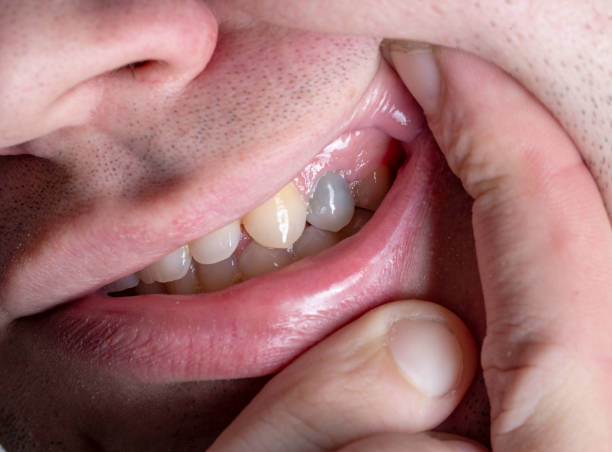Beneath the outer enamel and dentin layers of our teeth, hidden from view, lie intricate networks of nerves and blood vessels. These vital components play a crucial role in maintaining the health and vitality of our teeth. However, when this delicate balance is disrupted, problems can arise, leading to tooth decay and even the death of the tooth.
Our dental professionals with North Suburban Dental will delve into the world of dead teeth, exploring their causes, symptoms, and potential treatment options, including the possibility of a root canal.

Causes Of Dead Nerves In A Tooth
A dead tooth, often referred to as a non-vital tooth, occurs when the nerves inside the tooth lose their blood supply. This can happen due to various reasons, including:
- Dental Trauma: A sudden impact or injury to the tooth can sever the blood vessels supplying the nerve, leading to its death.
- Deep Decay: Untreated cavities can penetrate deep into the tooth, reaching the nerve, and causing infection or nerve death.
- Tooth Fracture: A crack or fracture in the tooth can expose the nerve to harmful bacteria, leading to nerve damage.
- Long-Lasting Infection: Prolonged tooth decay or untreated infections can eventually affect the nerve, causing it to die.
Dead Tooth Symptoms To Watch Out For
Identifying the signs of a dead tooth can be crucial for timely intervention. Common symptoms of a dead tooth may include:
- Discoloration: The tooth may appear gray, yellow, or darker than the surrounding teeth.
- Pain or Discomfort: While some individuals may not experience pain, others may feel discomfort, especially when biting or chewing.
- Sensitivity: While the pain of a toothache can exist, you’re more likely to experience heightened sensitivity to hot or cold temperatures, which can indicate nerve damage.
- Bad Breath: An unpleasant odor or taste may develop due to bacterial infection within the tooth.
- Swelling and Abscess: In some cases, a dental abscess may form, leading to swelling and discomfort in the gums.
Will A Dead Tooth Fall Out On Its Own?
A common misconception is that a dead tooth will naturally and eventually fall out. In reality, dead teeth do not typically fall out on their own, despite the lack of blood flow to the tooth that causes the tooth to die.
Instead, they often require dental intervention to prevent further complications and to preserve the surrounding healthy teeth and oral health. This usually includes a tooth extraction or root canal if the whole tooth is not completely dead.
Can a Dead Tooth Cause Health Problems If Left Untreated?
Yes, a dead tooth can potentially lead to various health problems if left untreated. While it might seem like a minor dental issue, it can have broader implications for your overall health. Here are some potential health problems associated with a dead tooth:
- Oral Infections: A dead tooth can serve as a breeding ground for harmful bacteria. These bacteria can multiply within the tooth’s pulp chamber and lead to a dental abscess. If the infection spreads, it can affect neighboring teeth, gums, and even the jawbone.
- Chronic Pain: While not everyone with a dead tooth experiences pain, it is possible to develop chronic discomfort or acute pain due to infection or inflammation around the tooth. This pain can interfere with daily activities and quality of life.
- Systemic Health Concerns: Some studies suggest a link between untreated dental infections, like those associated with dead teeth, and systemic health issues. These may include cardiovascular problems, respiratory infections, and complications in individuals with compromised immune systems.
- Tooth Mobility: A dead tooth can become loose over time, affecting your ability to bite and chew properly. It may also lead to changes in your bite alignment, potentially causing additional dental problems.
- Bad Breath: Bacterial growth within a dead tooth can result in persistent bad breath, which can be socially distressing.
- Spread of Infection: If the infection from a dead tooth spreads to other parts of the body, it can lead to more serious health complications. While rare, untreated dental infections have been associated with conditions like endocarditis (infection of the heart’s lining) and brain abscesses.
Given the potential health risks, it’s essential to address a dead tooth promptly.
Getting A Root Canal For A Dead Tooth
One of the most common treatments for a dead tooth is a root canal procedure. This involves removing the dead or infected pulp tissue from the tooth, cleaning the inner chamber, and sealing it to prevent further infection. A crown is often placed on top of the tooth to restore its strength and appearance.
A dead tooth can be a complex dental issue that requires timely attention and professional care. Understanding its causes, recognizing its symptoms, and seeking appropriate treatment can help you maintain a healthy and vibrant smile. If you have concerns about a dead tooth or related dental issues, reach out to the experts at North Suburban Dental for expert guidance and exceptional dental care.
Emergency Dentistry With North Suburban Dental
At North Suburban Dental, we understand the urgency of addressing a dead tooth, which can lead to significant discomfort and oral health issues. Our experienced team specializes in emergency dentistry, including root canal treatments, to provide prompt and effective care when you need it most. If you suspect you have a dead tooth or are experiencing related symptoms, don’t hesitate to contact us for a comprehensive evaluation and personalized treatment plan.



